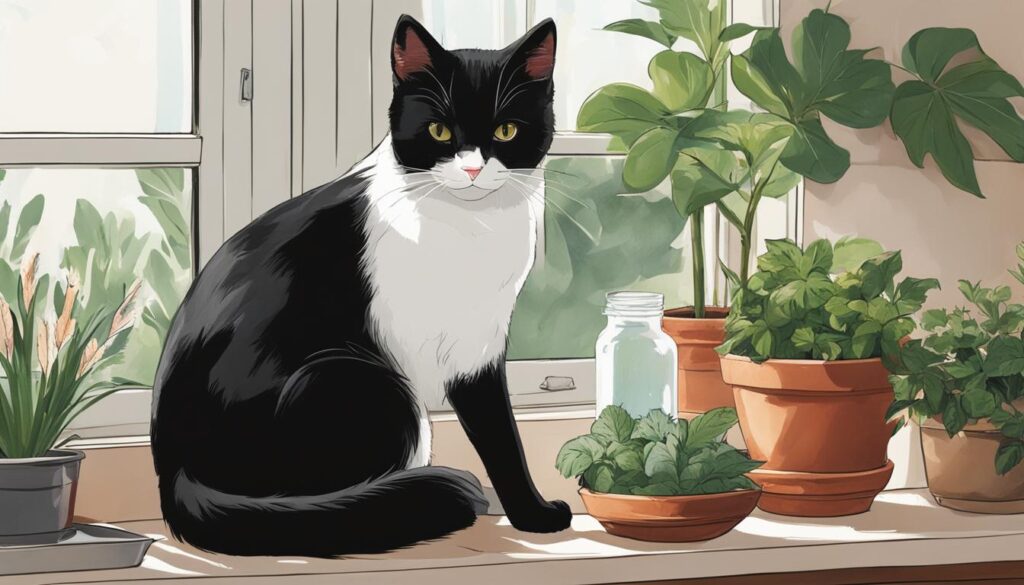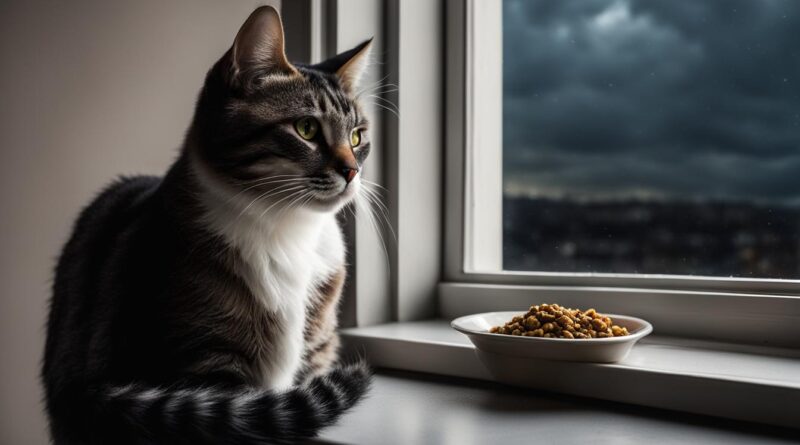Deciding When to Put Down a Cat with FIV
Deciding when to put down a cat with FIV, or feline immunodeficiency syndrome, can be a heart-wrenching decision for any cat owner. FIV is a lifelong disease that weakens a cat’s immune system, leaving them vulnerable to various infections and illnesses. As the disease progresses, it’s essential to consider the cat’s quality of life and seek guidance from a veterinarian.
While cats with FIV can live for many years with proper care, there may come a time when euthanasia becomes the most compassionate choice. This decision should only be made after careful consideration of the cat’s well-being and consultation with a trusted veterinarian.
Key Takeaways:
- Deciding when to euthanize a cat with FIV is a deeply personal decision that requires careful consideration.
- FIV weakens a cat’s immune system, making them more susceptible to infections and illnesses.
- Monitor the cat’s quality of life, progression of the disease, and consult with a veterinarian for guidance.
- Cats with FIV can still live fulfilling lives with proper treatment and care.
- If the cat’s quality of life is greatly diminished and their symptoms are severe, euthanasia may be the most humane option.
Understanding Feline Immunodeficiency Virus (FIV)
Feline immunodeficiency virus (FIV) is a retrovirus that weakens a cat’s immune system, making it more susceptible to infections and other illnesses.
Symptoms of FIV in cats can be varied and may include:
- Weight loss
- Lethargy
- Fever
- Enlarged lymph nodes
In addition, specific conditions such as gastrointestinal diseases, respiratory infections, and skin infections can also be observed in cats with FIV.
Diagnosing FIV in cats is possible through a blood test at a veterinary practice. By regularly monitoring the cat’s health and seeking veterinary care as needed, early detection and intervention can help manage the progression of the disease.
It is crucial to provide proper care and support to cats with FIV, as their weakened immune system requires diligent attention to their overall well-being to prevent complications. Seeking immediate veterinary care when symptoms arise or worsen is essential for the cat’s health and quality of life.
As an example, here is a table highlighting the symptoms commonly associated with FIV in cats:
| Symptoms of FIV in Cats |
|---|
| Weight loss |
| Lethargy |
| Fever |
| Enlarged lymph nodes |
| Gastrointestinal diseases |
| Respiratory infections |
| Skin infections |
In summary, understanding the symptoms of FIV in cats and diagnosing the virus early through appropriate testing can greatly impact the management and overall well-being of the cat. Regular monitoring and timely veterinary care are essential for providing the necessary support and treatment to cats with FIV.
Treatment and Care for Cats with FIV
While there is no cure for FIV, cats with the virus can still live fulfilling lives with proper treatment and care. It’s important to provide comprehensive care and support to ensure the well-being of your FIV-positive cat.
1. Managing Secondary Illnesses
FIV weakens a cat’s immune system, making them more susceptible to infections and other illnesses. Treatment options for FIV focus on managing these secondary illnesses through a combination of antibiotics and symptomatic treatments. Your veterinarian will prescribe the appropriate medications and therapies based on your cat’s specific condition.
2. Indoor Living
To prevent the spread of the virus to other cats, it is crucial to keep your FIV-positive cat indoors. This helps protect them from potential infections and reduces the risk of transmitting the virus to other feline companions.
3. Stress-Free Environment
Creating a stress-free environment is essential for the overall well-being of your FIV-positive cat. Provide a quiet and calm space where they can relax and feel safe. Minimizing exposure to potential stressors, such as loud noises or changes in routine, can help reduce their anxiety levels and strengthen their immune system.
4. Regular Veterinary Check-ups
Maintaining regular veterinary check-ups is crucial for monitoring your cat’s health and addressing any emerging issues promptly. Your veterinarian will conduct comprehensive examinations to assess their overall condition, recommend appropriate vaccinations, and perform necessary tests to detect and manage secondary illnesses effectively.
5. Nutritious Diet
A well-balanced and nutritious diet is essential for supporting your FIV-positive cat’s immune system and overall health. Consult your veterinarian to determine the best dietary plan, taking into account your cat’s specific needs, age, and any potential dietary restrictions. Ensure they have access to fresh water at all times.
With proper treatment, care, and support, cats with FIV can lead happy and fulfilling lives. Remember to consult with your veterinarian to develop an individualized care plan that meets your cat’s specific needs and enhances their quality of life.

Considering End-of-Life Care for Cats with FIV
As FIV progresses, cats may experience a decline in their overall health and quality of life. The life expectancy of a cat with FIV can vary, with some cats living for several years and others experiencing a shorter lifespan. In the final stages of FIV, the cat’s symptoms may worsen, and they may exhibit signs of pain, discomfort, and a decrease in normal behaviors. At this point, it may be necessary to consider end-of-life care options, including euthanasia, to prevent further suffering.
It’s important to closely monitor the progression of FIV in cats and work closely with a veterinarian to determine the best course of action. While some cats may respond well to palliative care, managing pain and discomfort, others may reach a point where their quality of life is greatly diminished.
During the final stages of FIV, cats may experience a range of symptoms such as severe weight loss, chronic infections, neurological impairment, and organ failure. These symptoms can significantly impact their well-being and daily activities. As pet owners, it’s crucial to assess the cat’s quality of life and consider their ability to engage in enjoyable activities, their appetite and hydration levels, and their overall comfort.
If a cat’s pain and discomfort cannot be adequately managed through palliative care, euthanasia may be a compassionate option to prevent further suffering. It’s essential to consult with a veterinarian who can provide guidance, support, and help make an informed decision regarding end-of-life care.
End-of-Life Care Considerations for Cats with FIV:
- Regularly assess the cat’s quality of life, considering factors such as pain, discomfort, ability to engage in normal activities, and overall well-being.
- Work closely with a veterinarian to determine the most appropriate end-of-life care plan for the cat.
- Ensure adequate pain management and palliative care measures are in place to maximize the cat’s comfort.
- Consider the cat’s psychological well-being and emotional needs during this time.
- Discuss euthanasia as an option if the cat’s quality of life is significantly compromised and suffering cannot be adequately managed.
Symptoms and Progression of FIV in Cats
| Stage | Symptoms |
|---|---|
| Early Stage | – Mild or no symptoms – Inflammation of the gums and mouth – Enlarged lymph nodes |
| Middle Stage | – Weight loss – Lethargy – Poor coat condition – Frequent infections |
| Advanced Stage | – Severe weight loss – Chronic infections – Neurological impairment – Organ failure |
When considering end-of-life care for a cat with FIV, it’s important to remember that each case is unique, and the decision should be based on what is in the best interest of the individual cat. The ultimate goal is to ensure that the cat’s final days are as comfortable and dignified as possible, minimizing any pain or suffering they may experience.

Conclusion
Deciding when to put down a cat with FIV is a deeply personal decision that requires careful consideration of the cat’s well-being and quality of life. It’s important to consult with a veterinarian who can provide guidance and support during this difficult time. Ultimately, the goal is to ensure that the cat’s final days are comfortable and dignified. If the cat’s symptoms are severe and their quality of life is greatly diminished, euthanasia may be the most humane option. Remember to prioritize the cat’s welfare and seek professional advice to make an informed decision.
Signs of FIV in cats can vary, and it’s crucial to monitor the cat’s health closely. Common FIV symptoms include weight loss, lethargy, fever, enlarged lymph nodes, gastrointestinal diseases, respiratory infections, and skin infections. Regular veterinary check-ups and prompt medical intervention can help manage these symptoms and improve the cat’s quality of life.
When considering euthanasia for a cat with FIV, it’s essential to assess the progression of the disease and the cat’s overall well-being. The decision should prioritize the prevention of unnecessary suffering. If you’re unsure about the best course of action, reach out to a compassionate veterinarian who can provide expert advice tailored to your cat’s specific needs.
FAQ
When should I consider euthanizing a cat with FIV?
Deciding when to put down a cat with FIV depends on the individual cat’s quality of life and the advice of a veterinarian. It’s important to assess the cat’s overall health and well-being, including the progression of the disease and any signs of pain or suffering.
What are the symptoms of FIV in cats?
Symptoms of FIV in cats can vary but may include weight loss, lethargy, fever, enlarged lymph nodes, and specific conditions such as gastrointestinal diseases, respiratory infections, and skin infections. It’s important to monitor the cat’s health and seek veterinary care if any concerning symptoms arise.
How is FIV diagnosed in cats?
FIV can be diagnosed through a blood test at a veterinary practice. If you suspect your cat may have FIV or if your cat is exhibiting symptoms, it’s important to schedule an appointment with a veterinarian for testing and guidance.
What treatments are available for cats with FIV?
While there is no cure for FIV, cats with the virus can still live fulfilling lives with proper treatment and care. Treatment options focus on managing secondary illnesses and infections through measures such as antibiotics and symptomatic treatments. Regular veterinary check-ups, providing a stress-free environment, and a nutritious diet can also help improve the cat’s quality of life.
What is the life expectancy of a cat with FIV?
The life expectancy of a cat with FIV can vary, with some cats living for several years and others experiencing a shorter lifespan. It’s important to regularly monitor the cat’s health and consult with a veterinarian to ensure the best possible care and support for your FIV-positive cat.
What are the final stages of FIV in cats?
As FIV progresses, cats may experience a decline in their overall health and quality of life. The final stages of FIV can involve worsening symptoms, increased pain and discomfort, and a decrease in normal behaviors. It may be necessary to consider end-of-life care options, including euthanasia, to prevent further suffering.
How can I make an informed decision about euthanizing a cat with FIV?
Deciding when to put down a cat with FIV is a deeply personal decision that requires careful consideration. It’s important to consult with a veterinarian who can provide guidance and support during this difficult time. By prioritizing the cat’s welfare and seeking professional advice, you can make an informed decision that ensures the cat’s final days are comfortable and dignified.


